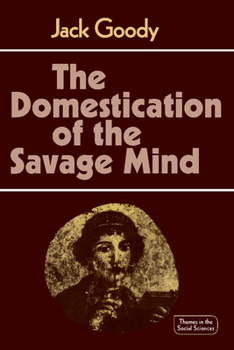The Domestication of the Savage Mind
Select Format
Select Condition 
Book Overview
Current theories and views on the differences in the 'mind' of human societies depend very much on a dichotomy between 'advanced' and 'primitive', or between 'open' and 'closed', or between 'domesticated' and 'savage', that is to say, between one of a whole variety of 'we-they' distinctions. Professor Goody argues that such an approach prevents any serious discussion of the mechanisms leading to long-term changes in the cognitive processes of human cultures or any adequate explanation of the changes in 'traditional' societies that are taking place in the world around us. In this book he attempts to provide the framework for a more satisfactory explanation by relating certain broad differences in 'mentalities' to the changes in the means of communication, and specifically to the series of shifts involved in the development of writing. The argument is based upon theoretical considerations, as well as empirical evidence derived from recent fieldwork in West Africa and the study of a wide range of source material on the ancient societies of the Near East.
Format:Paperback
Language:English
ISBN:0521292425
ISBN13:9780521292429
Release Date:November 1977
Publisher:Cambridge University Press
Length:192 Pages
Weight:0.66 lbs.
Dimensions:0.5" x 6.1" x 9.0"
Customer Reviews
1 rating
A Mind Opening Book
Published by Thriftbooks.com User , 23 years ago
I ran across this title in the bibliography of Jean Bottero's book on Mesopotamia, and am I glad I did. It's short, readable and incisive. In pursuit of the main subject, how literacy alters culture and consciousness, Mr. Goody takes us through a sharp critique of anthropological theory and literature, particularly dualist reductions in classification. Then he examines modern transitions from oral to literate culture in West Africa, and most interesting to me, brings us back to the birth of writing and classification in the ancient Near East and Mediterranean. Some trip! This book is not just for social science grad students.





